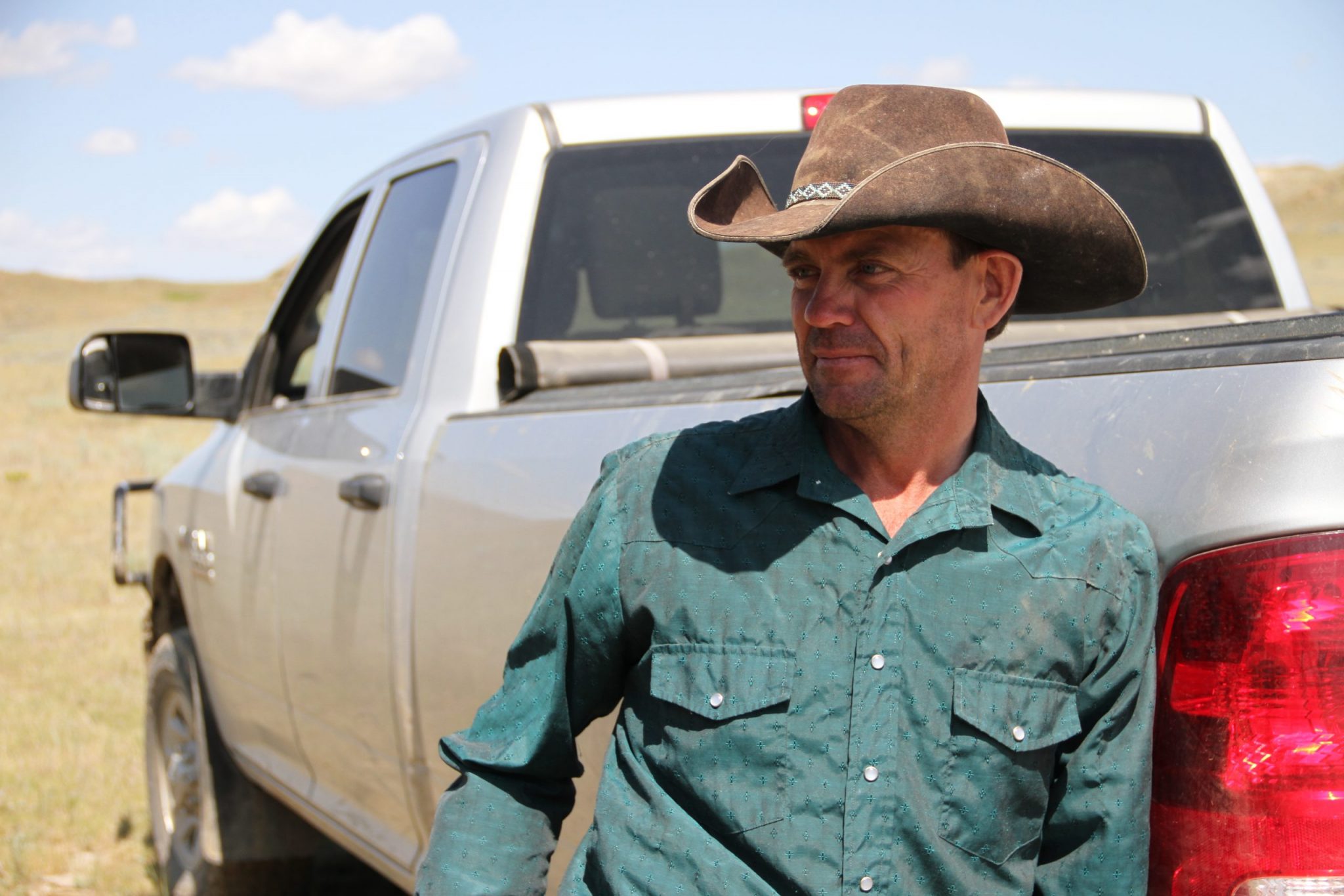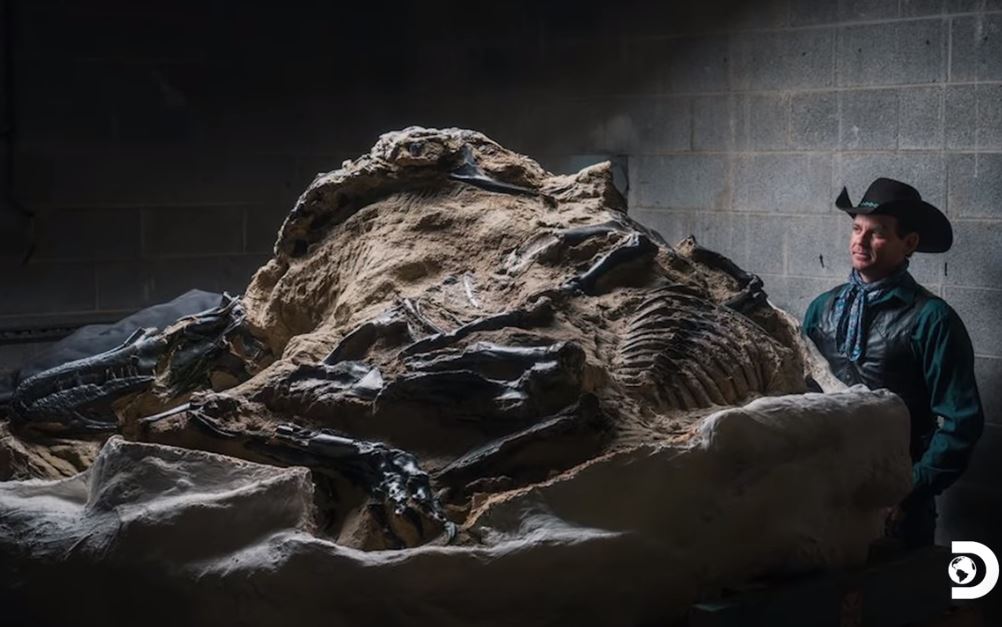‘Dino Hunters’ Exclusive Interview with Clayton Phipps on Finding Fossils In The Badlands

Imagine you find a dueling dinosaur pair in your backyard, and get to take it to New York City for a high dollar auction. Dino Hunters star Clayton Phipps is no novice to the lucrative world of fossil wrangling, and he’s likely got the most valuable to-date find of dinosaur remains from the Cretaceous period who died in a deadly embrace.
Discovery has bet the ranch on Dino Hunters, a fun Friday night series that was likely inspired by a 2014 Men’s Journal article that touted the work of reinvented cowboy Clayton Phipps who found out there was more money under the soil than driving steer across it.
That fact has created a small army of folks, many related, all around him who also have joined in the race to carefully dig up and preserve fossilized dinosaurs and sell them to academics and museums, or even private collectors.
As an amateur paleontologist, Clayton Phipps previously discovered a 22-foot-long carnivorous theropod and a 28-foot-long plant-eating ceratopsian believed to have perished over 66 million years ago. These creatures were dubbed the “Dueling Dinosaurs” fossil. Clayton and his cousin Chad O’Connor and friend Mark Eatman had made this discovery out in Hell Creek (or crick as the locals call it) in Montana, a hot spot for finding fossils.
Eventually academics checked out their find and agreed, Phipps and company had found a well-preserved treasure.
Discovery’s series follows Phipp’s daily work and the new finds he and others featured on the show are making, along with the ongoing saga of finding the right home for this marvelous “Dueling” fossil.
There are real-time issues, such as fossil poachers and a few sour academics who dismiss the importance of these cowboy paleontologists’ work.
But we found out that Phipps is more concerned to get the fossils safely out of the soil intact before the harsh climate of the great Northern plains.
He knows that these Badlands can quickly eat away at the evidence our Earth once was home to creatures so lethal and large, that they make our modern day troubles look laughable.
Family life and son Luke Phipps
https://www.facebook.com/Discovery/videos/2726575917667416/
On Dino Hunters, we see him working with his son, Luke Phipps, with the hopes of finding their next big fossil.
Outside of his work, Clayton is a married father of three living in russet, Montana. It is his son Luke who has the same dinosaur hunting “bug” as his dad. His knowledge and instincts prove that Luke will make a mark in the field professionally some day.
TV Shows Ace caught up with him yesterday.
In Montana it seems you have the bounty of these fossils, so for people new to your amateur paleontology line of work, what was it specifically that got you kind of thinking this is how I can make a living versus what you had set out to do in life early on?
Clayton Phipps: When I first started, it was a fellow who came by the ranch and he was showing me some pieces of triceratops that he found. He camped all weekend and come back, and he was telling me that there were some value to all those little pieces that he found.
I thought, well, heck, I’m going to start looking and just see if I can find something.
I enjoyed this work and the whole discovery part is kind of what keeps me going. It’s just fun, but it did take some fun out of it when I had to make it a job and start feeding the family with it.
And it was challenging and quite a gamble, but, we were blessed to find a few pretty cool dinosaurs and hopefully we get to find some more.
You mentioned family. I know you have two other children other than Luke, and now what is it about Luke made him want to work alongside you? What did you recognize in him that made him actually part of this whole production in the show?
Clayton Phipps: Well, since he was just a little kid he wanted to go along. He likes to find those fossils too. And he’s starting to be pretty good at it.
Luke has found some pretty cool stuff and he just loves that. He’s got this bug that I have. We just like to go look for dinosaurs.
In the course of my research on you, I noticed that especially when you were in the heat of selling the Dueling Dinosaurs, certain people in the academic community has kind of pushed back a little bit on you…

Clayton Phipps: Well, Yes and no. there’s some very great academic paleontologists out there that, that are decent human beings that respect other people and what they do. And they acknowledged that us commercial people find a lot of cool dinosaurs and bring them to life and bring them to the public eye.
We save them from certain destruction because as soon as the fossil hits the surface, it starts to erode. So there’s a short window to find one and save it forever.
And if there’s not people out there doing that, they dissolve away to nothing. There’s a lot of very good academics out there that acknowledge us. Who I think respect us… and there’s bad people on both sides.
There’s people that go out there and poach from landowners and sell on the black market. There’s bad people just like in every other walk of life. And as long as you’re a decent human being and treating people right. That’s really all you need to do.
How do you prevent opportunists, or thieves, from sifting through your properties? Is there a network or a way that you all communicate so that everyone’s on the up and up?
Clayton Phipps: Well, I guess reputation kind of proceeds you, but yes, new people coming out, most ranchers are aware of that. If there’s someone on their place, well they may own thousands of acres, but they’re out there on the land every day, checking their cattle and fixing fence and just taking care of things.
And you’ll notice things, you’ll notice tracks, and you’ll know if somebody’s been on your place. There’s no doubt you will see the activity. Yes, (laughs) I mean, a lot of them (ranchers) will shoot you, so I would not recommend sneaking around!
Funny. Tell me about how the show came to be…
Clayton Phipps: Oh, a friend of mine told me that there was some interest in the show, and actually in the last 10 years, I’ve probably had upwards of 30 production companies contact me. partly due to the Men’s Journal article that came out. That brought a lot of them out, and they were interested in what I do.
And this is the first one that got picked up by a network. And they would come out and film [sizzle reels] and trailers and stuff, and I just never really seemed to go anywhere, but this one got picked up.
I think the way the producers put it together is just really awesome. This show with all the graphics that they have in it. I really am excited to be a part of it. It’s a cool show.
It is a cool show. It feels like the dinosaurs are evergreen. They never go out of style and people are never stopped being interested in them. It seems like every crop of children, when they learn about the dinosaurs or see them, it sparks a whole new legion of fans…
Clayton Phipps: It does. Yeah. Yep.
As far as marketing or selling fossils, does it wax and wane, or is there a steady market for these relics that maybe people want to display either museums or for really rich people, in their homes?
Clayton Phipps: You know, there’s a lot of highs and lows. We had started doing dinosaurs 14 years ago, and the money’s been flowing for 14 years, but it was going the wrong way.
I had a lot in this project and a lot into that project. So, I mean, yes and no. the small things… the teeth and claws, I find isolated ones here and there and they kind of kept the bills paid and kept me out there looking for the next big find.
The economy is a big factor in it. When people are doing well they are more apt to spend their money on a dinosaur fossil and when the economy’s down I think it’s just like everything else. There’s less money out there. So there’s highs and lows.
Now this show and I’m assuming it’s going to go to season two, because it really is a terrific Friday night show. And everyone that I’ve talked to that watches it, they’re just hooked on what you’re doing. Will you expand your operation beyond your lands?
Clayton Phipps: We already have. I don’t know if there’s a misconception out there, but I’ve been to four different states. I’m looking for dinosaur bones. The American West is huge. If I were limited to my little place, I wouldn’t find much there.
It does have a little bit of the Hell Crick formation on it, but you literally have to walk thousands of miles to find a good dinosaur, unless you’re extremely lucky.
You have to cover the country. It’s not just walk out there and find a dinosaur, or it doesn’t work that way and I have been doing it 20 years and I’m still not financially secure. I have some good friends that are retirement age that have been hunting dinosaurs their entire lives and they they’re just scraping by.
So, I mean, don’t get stars in your eyes. That’s my advice to somebody that maybe wants to jump in this fully with both feet.
So there was a movie called City Slickers with actor Jack Palance about people coming out to Wyoming to get away from the city. Are there experiential trips or people skipping a dude ranch to round up cattle to just look for fossils?
Clayton Phipps: Yes, there is. Yeah, my brother’s actually starting to do a dinosaur big family digs on his ranch.
And there’s one over in Eastern Montana on the Baisch Ranch. And they’re good people too. I’ve met that family and they’re super nice people too.
That would be a fun Sunday for a family, for sure. Both of them. I think both places I mentioned have bunkhouses for people to stay in and showers and cookstoves and whatnot. I think you can go out for a day or longer.
Who else can you talk about on the show and how they were worked into the production?
Clayton Phipps: I’ll start with my cousin, Jodie, she’s the one that found the Nanotyrannus that we worked on during the first season here and that she is my cousin and she and her family got into dinosaurs, I think, because of me.
They started looking on their place and she found a really good one, and then we contracted with them to excavate it. Her husband, Kelly, I think, is probably on the show and maybe a couple of her kids… and then I have my partners, Chris and Katie, and Nate.
I’ve been working with them for a few years and actually Chris and Katie I’ve worked with for almost 20 years.
I learned a lot from Chris, he studied academic paleontology when he was young and switched over to commercial field, and he’s been a great help. He understands what the academics need and has been trying to train this cowboy how to do the science at the sites and preserve that information for science. And for 20 years, (laughs) I think he’s finally getting through to me.
I just liked to find dinosaurs and preserve them and for the scientists to study, that’s what I like to do. Chris has been a big, big help to me, for sure.
What dinosaur is the one that got away or the one that you really want to find before you meet your maker?
Clayton Phipps: (Laughs) Well, a really nice Dromaeosaurs would be cool. Or maybe a skeleton like a Pachycephalosaurus …they’re extremely hard to find, there’s only a handful. And an Ankylosaurus dinosaur or any little raptor would be nice.
You bust out those names so effortlessly. I know you are amateur paleontologist. How did you study? How did you become so knowledgeable? Were you just self taught?
Clayton Phipps: I think I was passionate about it and I wanted to learn, and, and if you stop learning, you might as well quit now. So it wasn’t easy. There wasn’t a lot out there on how to get a dinosaur out of the ground safely.
There were some books on dinosaurs, but there really wasn’t any videos or anything, when I started on how to go about excavating one. And hopefully this, people might learn from the show what we do and how much work it is. There’s a lot of work goes into taking a 20,000 pound block out of the dirt safely.
Are there any scientists who know the work that you do and the passion you have, and ask if they can come up there and help you get this safely out of the ground or study the the soil, all the things that academics say that you need to do when you’re excavating a dinosaur?
Clayton Phipps: There absolutely is. Yes, there absolutely is. It’s a small percentage of them [academics] that absolutely dislike what we do.
I would say there’s a bigger handful now, especially since the Dueling Dinosaurs were discovered. I thought, well they won’t be able to criticize us any longer. We found probably the coolest dinosaurs in the world now. this will be the thing that bridges the gap and helps us all work together.
And obviously that’s beneficial to all. Most of our clients are museums and institutions and they make up the majority of the major specimens for sure.
Or any commercial outfit. And it’s in our best interest to work together. And yes, we have. I’ve done a couple projects with academics right on site and work together with them.
And at the end the result was fabulous.
Dino Hunters airs Friday at 9p on Discovery Channel

